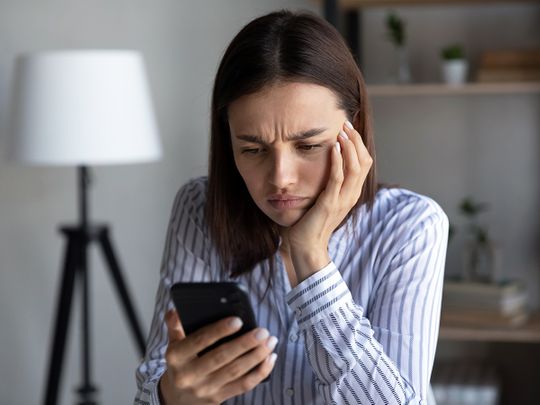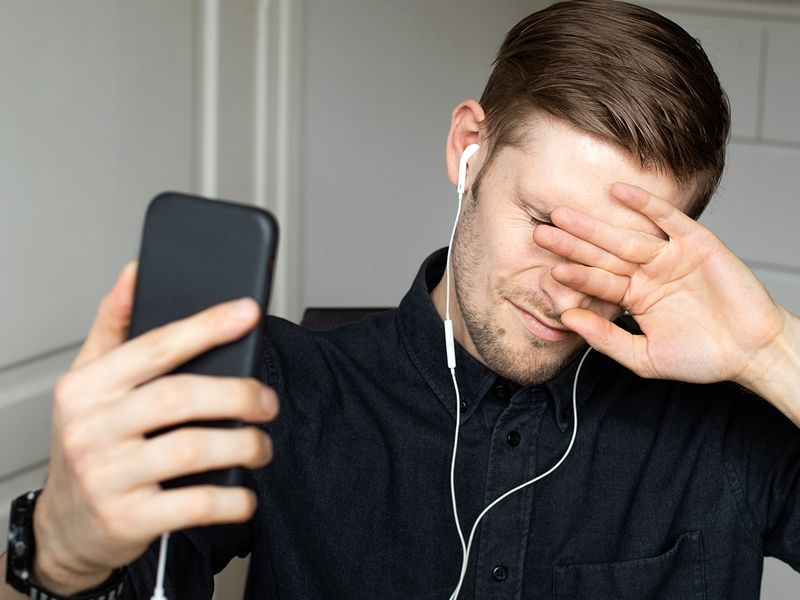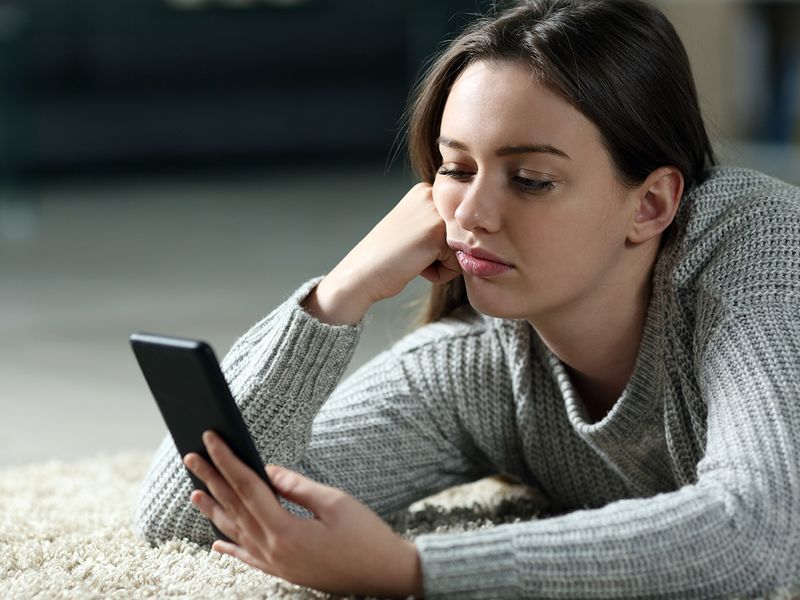
In 2021, 23-year-old Sharon Philip, a social media manager from Dubai, did something not many 20-year-olds would ever think of doing - she went offline from both WhatsApp and Instagram. Calling herself a ‘people-pleaser’, she said it was time to prioritise herself.
"As a person, I am available to everyone. I am also a people pleaser. It came to a point where I was exhausted, and I knew it was time to prioritise myself. I decided to switch off completely. I deleted both apps. It wasn’t easy. Mainly because I was working, so I couldn’t switch off.”
She had contingency plans where she had a spare phone and number just to contact her office colleagues. Philip said those four days were “peaceful” and she was able to re-center herself. Today, she is far more detached from her phone than before.
“I keep my phone on DND (Do not disturb) mode or mute my WhatsApp chats. This allows me to focus on things that need my immediate attention. Additionally, it helps in taking control of your emotions. It’s a virtual world lived through text messages, and considering we rely mostly on these screens, a lot gets lost in translation and leaves room for much miscommunication and worsens your mental health,” she adds.
It is not exactly a Luddite movement but there are many more Gen Z and millennials doing the same.

As a person, I am available to everyone. I am also a people pleaser. It came to a point where I was exhausted, and I knew it was time to prioritise myself. I decided to switch off completely. I deleted both apps [Instagram and WhatsApp]. It wasn’t easy. Mainly because I was working, so I couldn’t switch off.
Thirty-five-year-old Bilal Hassan, an engineer from Dubai, prefers to use his phone sparingly, too. He observes how social media has just made people 'spectators', and replaced the willingness to learn and develop themselves through new experiences. "Then for those who can build a fan following, there is a high, and the anxiety of not ever having that high outside social media. They also suffer from constantly being bombarded by those doing even better than themselves and comparisons loom large in their head. They want to exit it but somehow their highs and lows are connected to social media, and it’s like a trap."
Twenty-seven-year-old Krishna Priya Pallavi, a journalist based in Delhi, India, frequently disconnects from the world of WhatsApp and social media on her phone, especially during her weekend from office, to re-centre as the noise got too much.

Social media has never really been a distraction for me. I'm a very action-oriented person. I like to do stuff. I can't sit and browse social media for hours at a time. I've never felt the urgency to know something (or someone) who has no major impact on my life.
She began the practice of logging off a year ago, and learnt that it was the best way to unwind. “Being a journalist, I am always on my phone, and sometimes it becomes overwhelming to spend so much screen time for work and then for personal reasons. But stepping away from my device for a day or two, helps my mind return to its factory settings, relaxes me entirely, and just reduces the anxiety caused by social media and work.”
She found that productivity saw a rapid increase whenever she switched off the phone for those few days. There was no need to check photos on Instagram, or look at distressing tweets and she could finally enjoy just being by herself and actually being physically present with her friends and family. “It is a great way to detox from the everyday hustle and concentrate on things that you actually enjoy or be physically present for people around you,” says Pallavi.

Being a journalist, I am always on my phone, and sometimes it becomes overwhelming to spend so much screen time for work and then for personal reasons. But stepping away from my device for a day or two, helps my mind return to its factory settings, relaxes me entirely, and just reduces the anxiety caused by social media and work.
Then there are those like forty-six-year-old Arnab Ghosh, a marketing professional, martial arts artist and freelance writer from Dubai who made a lifestyle choice early on. He learnt how to prioritise his real life over digital around the onset of Blackberries itself, 15 years ago. “When I got my first Blackberry, I was always checking the phone and conscious of the blinking light. But I realised I was doing that perhaps rather too often. I had different light colours set up, so I knew at a glance whether it was a work email or a text message.
"Social media has never really been a distraction for me. I'm a very action-oriented person. I like to do stuff. I can't sit and browse social media for hours at a time. I've never felt the urgency to know something (or someone) who has no major impact on my life.”
Breaking with the habit
Curiosity killed the cat they say. Well, smartphones seem to be doing that these days. You keep consuming content. You keep getting notifications. It’s like Groundhog Day but on a superfast loop. There’s just one word to describe this – exhaustion. However, that still doesn’t seem to stop most of us.
Owing to constant connectivity through just one device, our attention is fragmented, says Farah Dahabi, director of Mental Health First Aid at Dubai-based clinic Lighthouse Arabia.
“We experience spikes in dopamine when we receive notifications, making us more susceptible to becoming addicted. The constant distraction and fragmentation we experience can lead to feeling mentally exhausted and like you're living in a state of reactivity,” she says.

We experience spikes in dopamine when we receive notifications, making us more susceptible to becoming addicted. The constant distraction and fragmentation we experience can lead to feeling mentally exhausted and like you're living in a state of reactivity.
Thirty-four-year-old Esra Trepci, an engineer from Dubai, finds herself scrolling on the phone till she falls asleep, daily.
“This has become a problem,” she says, explaining that till she disconnects the phone and internet at night, she keeps checking the device. “The only time I really disconnect is if I am forced to, at work, during a meeting, or when phones are not allowed. On a daily basis, I notice that I pick my phone way too often for just scrolling, as a break from reality.... I am even searching for an alternative to what to do when I need a break,” she adds.
“It’s a hard habit to break," says 38-year-old Jamie Hutchins, a tech director who studied in the UAE before moving to Toronto, Canada. "I find myself just automatically reaching for my phone whenever there is a still moment. That’s a hard habit to break. I don’t need the phone for anything, it’s just like how can I keep my hands and mind busy instead of just embracing the silence.”
Mental health expert Dahabi notes that there is evidence that using a smartphone in bed results in poor sleep quality, due to the effects of the blue light. “By using our phones less before bed, we can improve the quality of our sleep and wake up feeling more rested. A good night's sleep, seven straight hours at least, is the single most effective thing you can do for your mental and physical health,” she advises. You have to disconnect.

The only time I really disconnect is if I am forced to, at work, during a meeting, or when phones are not allowed. On a daily basis, I notice that I pick my phone way too often for just scrolling, as a break from reality.... I am even searching for an alternative to what to do when I need a break
How to disconnect from your phones, a step-by-step guide by experts
Understand your pattern
First, you need to understand the extent you depend on your phone, explains Dahabi. Understand yourself, why, how and when you automatically reach for your phone. Observe your patterns, check the screen-time and see when you look at your phone and for how long.
Gita Jayakumar, a mental health and wellness practitioner based in Chennai India, says arbitrary abandonment of phones is not the solution.
“Anything drastic like sudden disconnection doesn’t work - you have to give your body what it needs. The preliminary step is to understand that you have a problem. If you sweep it under the carpet, it will emerge again,” she says. “You’ve to understand what the trouble is - why you keep reaching towards your phone, and understand first, what is lacking in your life and why you are using the phone as a substitute.”

Set rules for yourself
Start by setting limits on how much time you spend on your phone. Establish specific times when you check your phone, rather than checking it throughout the day mindlessly. Attempt phases when you put your phone into airplane mode or put on the ‘Do not disturb’ button, and inform your friends that you will not be available for a while.
Turn off notifications that are not essential and work towards responding to what is essential rather than just constantly responding to the stream of notifications, Dahabi suggests. Make rules for yourself and stick to them - no phones in bed, at the dinner table, or during time with family and friends.
Start small
It’s difficult to quit at once, so pace yourself, warns Dahabi. Start by putting your phone off for 30 minutes, gradually increase it, and leave your phone at home when you go for walks or for any outdoor activity.

Regular digital detox
Soon, you’ll notice the dependency on your phone decreasing. Attempt regular digital detoxes - start by going a day without your phone, and slowly increase it for the weekend, where you avoid all social media and attend to only important phone calls.
Focus more on engaging with the outside world, and pursue other fun hobbies and sports, like swimming or expressive arts - enjoy the actual, real world around you, rather than the virtual one trapped in your phone screen.












